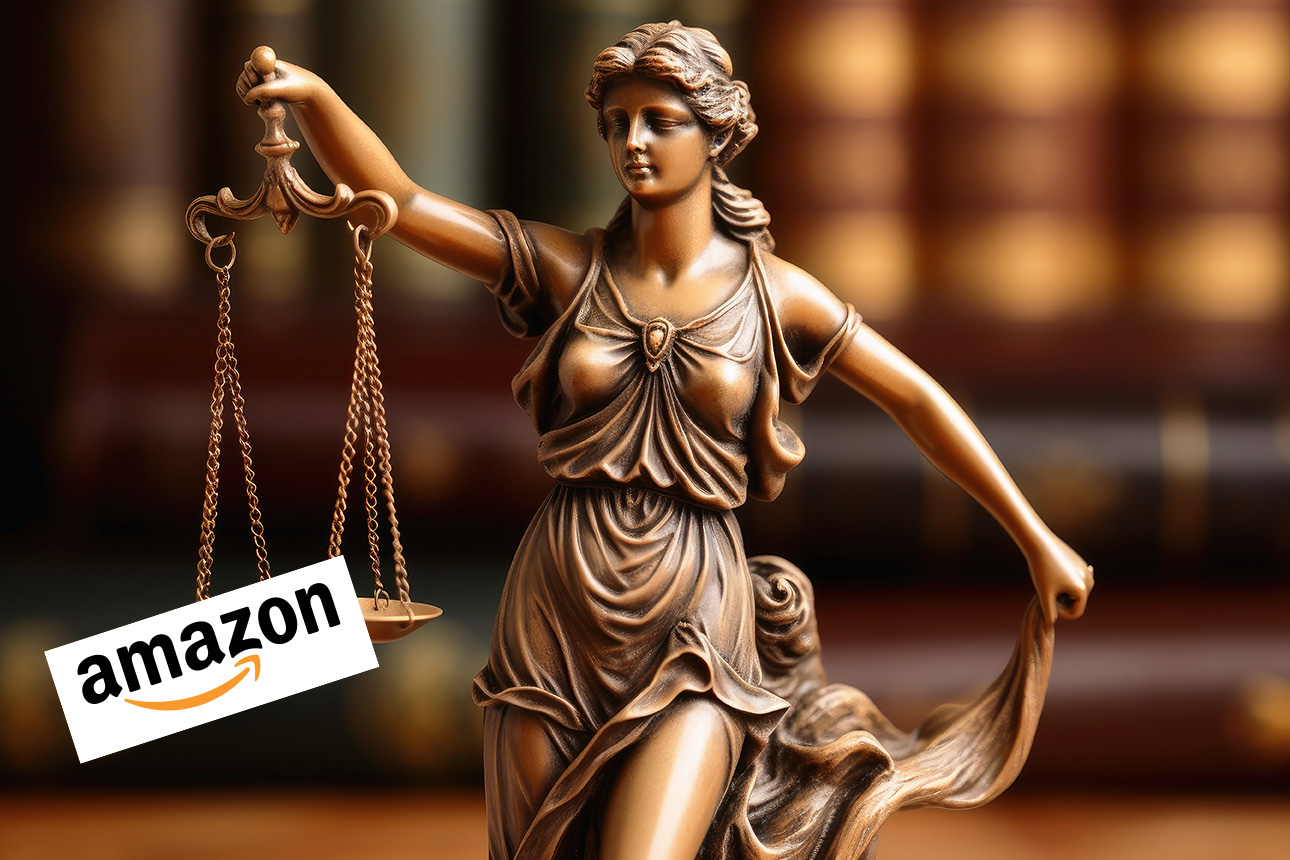
Amazon Sued by FTC for Price Inflation, Monolopy in Antitrust Lawsuit — How This Affects You
Sep 28, 2023 4 minutes
In a significant move that sends ripples across the American e-commerce landscape, Amazon.com, Inc is in the legal crosshairs once again, facing a substantial antitrust lawsuit that questions its marketplace dominance and business practices.
The Federal Trade Commission (FTC), backed by 17 U.S. states, has rolled out a comprehensive legal challenge accusing the online superstore of engaging in anti-competitive practices that not only inflate prices for consumers but also impose an undue burden on sellers, stifling the competitive spirit of the online retail market.
The lawsuit emerges as a crucial turning point in the ongoing saga of Big Tech’s confrontation with regulatory authorities, illuminating the intricacies between monopoly power, antitrust law, and the digital economy.
For those keen to read and understand the dynamics of this legal battle, the key takeaway here is straightforward: The antitrust lawsuit represents not just a legal predicament for Amazon but also reflects the broader scrutiny and growing challenges faced by tech giants in the contemporary business environment.
At the heart of this lawsuit lie allegations that Amazon’s practices suppress competition and manipulate the market to its advantage, effectively cornering small businesses and third-party sellers while leaving consumers with higher prices and fewer choices.
Background of the Lawsuit
In recent years, the lens of antitrust scrutiny has increasingly focused on Big Tech companies, including not just Amazon but also Microsoft, Apple, and Meta. Regulators have grown concerned about the immense power these corporations wield, fearing the establishment of monopolies that hinder competition and harm both consumers and small businesses.
The term “antitrust” has thus become a buzzword, denoting a range of legal and business concerns pertaining to fair competition laws. These laws are designed to foster competition and prevent monopolistic practices, providing a level playing field for businesses of all sizes.
Previous Allegations Against Amazon
Amazon has not been a stranger to legal challenges and allegations. In the past, the company has been accused of using sensitive merchant data to launch competing products strategically, effectively disadvantaging other businesses on its robust platform.
There were also whispers and formal accusations about Amazon’s practices regarding price discounting and prioritizing their own product listings, raising eyebrows in the legal and business communities alike.
Activi
Regulatory Shift with FTC Chair Lina Khan
FTC Chair Lina Khan, known for her critical standpoint on Big Tech, has ushered in a new era of regulatory scrutiny. Under her leadership, there has been a discernible shift in how the Federal Trade Commission approaches and handles antitrust cases.
Khan, author of the notable “Amazon’s Antitrust Paradox”, has long advocated for a reevaluation of antitrust laws in the context of modern, digital-dominated commerce, voicing concerns about the potential erosion of competitive practices in the online retail sector.
Amazon Under the Microscope
With the antitrust spotlight firmly on Amazon, this isn’t the first legal rodeo for Jeff Bezos’ brainchild. Before this FTC lawsuit, Amazon faced other legal challenges, including a dismissed case in the District of Columbia and ongoing litigation in California and New York. Each case unveiled more layers of the complex practices Amazon employs, gradually painting a picture of a corporation allegedly willing to bend rules to maintain and extend its market dominance.
Lawsuit Overview
The antitrust lawsuit against Amazon was filed in a federal court in Washington state. This legal action results from an extensive investigation conducted by the Federal Trade Commission (FTC) and supported by 17 state attorneys general. Together, these entities have mounted a collaborative effort to address and counter the alleged anti-competitive practices deployed by Amazon.
Alleged Antitrust Violations
Central to the lawsuit are accusations that Amazon has violated both federal and state antitrust laws. These laws are designed to preserve competitive integrity in the marketplace. Amazon is accused of crafting an environment where sellers are deterred from offering their products at lower prices on non-Amazon sites, which critics argue manipulates the market to Amazon’s advantage and detriment of both sellers and consumers.
Specific Allegations
- Price Inflation: The lawsuit alleges that Amazon manipulates listings to hide lower prices available elsewhere, coercing consumers to make purchases thinking they are receiving the best deal available.
- High Seller Fees: Accusations point towards Amazon imposing exorbitant fees on sellers, who are then compelled to increase prices across the board, affecting consumers on and off Amazon’s platform.
- Degrading Customer Experience: Despite knowing of superior alternatives, Amazon is accused of prioritizing paid advertisements and its products, intentionally degrading the customer experience.
- Revenue from Sellers: With heavy fees, sellers purportedly relinquish nearly half of their total revenues to Amazon, a figure that has been on the rise since 2014, squeezing sellers’ profit margins and contributing to higher prices for consumers.
- Fulfillment Strongarming: Sellers are supposedly strong-armed into utilizing Amazon’s logistics and fulfillment services to be eligible for Amazon Prime’s benefits, even when they might prefer other logistic solutions.
Injunction Request
The FTC and the supporting states are not only seeking legal redress for the alleged antitrust violations but are also requesting a permanent injunction against Amazon. This injunction aims to prevent the continuation of the alleged unlawful practices and seeks to dilute Amazon’s “monopolistic control” over the e-commerce market, thereby hoping to restore a competitive balance to the benefit of sellers and consumers alike.
Amazon’s Defense
Below are the summarized responses by Amazon to the specific allegations listed above.
Refutation of Allegations
In response to the heavy barrage of accusations, Amazon staunchly defends its position, contending that the FTC’s allegations are both factually and legally unfounded. The e-commerce behemoth asserts that the practices under scrutiny are not only lawful but also in line with industry standards, with other large retailers allegedly employing similar strategies.
Consumer and Seller Impact
Amazon argues that adhering to the FTC’s desired outcome would limit product selections for consumers, increase prices, slow down deliveries, and reduce viable options for small businesses utilizing the platform. Amazon emphasizes its role as a vital and supportive marketplace for millions of third-party sellers, underpinning their argument that the platform operates for the greater good of both sellers and consumers.
Marketplace Competition
Amazon also points to the intense competition within the online retail sector, highlighting that its policies are designed to navigate through this competitive environment efficiently. The company suggests that their platform policies not only reflect but actively promote a competitive spirit, ultimately benefitting the bustling community of sellers and buyers that call Amazon’s store home.
Industry Reaction
The unfolding lawsuit has elicited a spectrum of reactions from different quarters of the industry. While consumer advocacy groups have thrown their weight behind the lawsuit, viewing it as a necessary measure to check Amazon’s growing power, some industry groups and observers argue contrarily. These voices suggest that Amazon’s policies are not unique, with other large retailers engaging in similar practices, thereby questioning the singularity of focus on Amazon.
Antitrust Scrutiny
Speculations abound regarding the possibility of a forced breakup of Amazon to curb its alleged monopoly power. If regulators succeed in making a compelling case, Amazon might have to divest some of its business units to ensure compliance with antitrust laws and restore competition in the sectors it operates.
Comparison with Other Tech Giants
The antitrust spotlight isn’t exclusively on Amazon. Other tech juggernauts, including Microsoft, Apple, and Meta (formerly Facebook), have also been under scrutiny for alleged anti-competitive practices. Drawing parallels and contrasts between these cases and Amazon’s provides a comprehensive understanding of the regulatory environment and the challenges Big Tech companies face.
Microsoft’s Activision acquisition was also just re-challenged after the FTC failed to block to deal last year, reasserting their position on monopolistic mergers (likely to appear more on antitrust and anti-monopoly and less as attacking Amazon).
Administration’s Stance
The shift in administration from Trump (republican) to Biden (democrat) has brought subtle changes to the approach towards Big Tech. It’s crucial to examine how different administrations view monopolistic tendencies, anti-competitive practices, and their strategies in dealing with giants like Amazon.
Amazon’s Antitrust Paradox
The term “Amazon’s Antitrust Paradox” coined by Lina Khan, refers to the conundrum where Amazon is celebrated for customer satisfaction due to lower prices and efficient service while being scrutinized for anti-competitive practices. This paradox encapsulates the challenges regulators face when trying to apply traditional antitrust laws to modern digital conglomerates.
Global Antitrust Landscape
The United States isn’t the only country raising concerns. Amazon faces antitrust scrutiny on a global scale, with regulators in the European Union and other jurisdictions examining the company’s business practices. International antitrust developments offer a broader perspective on the legal pressures Amazon navigates.
Implications for Online Business Owners
The lawsuit’s outcome could profoundly impact third-party sellers operating on Amazon’s platform. Should the FTC and the involved states prevail, Amazon may be compelled to adjust its fee structures and policies, potentially leading to a more favorable environment for sellers, with reduced fees and increased autonomy.
If the lawsuit results in mandatory changes to Amazon’s fulfillment practices, sellers might gain greater flexibility in choosing logistics and fulfillment partners. This shift could enable small businesses to explore more cost-effective or logistically efficient alternatives, which might currently be overshadowed by Amazon’s stringent requirements for Prime eligibility.
With accusations of Amazon discouraging sellers from offering lower prices elsewhere, a win for the FTC could empower sellers with more pricing freedom across different platforms, fostering a competitive pricing environment that could benefit both sellers and consumers.
Depending on the lawsuit’s outcome, the e-commerce landscape might experience a reshaping in market dynamics and competition. A reduction in Amazon’s dominance would potentially open doors for smaller e-commerce platforms and retailers, distributing market share more evenly and fostering a competitive, diverse online retail environment.
The case will likely set a precedent affecting not only Amazon but also other online marketplace platforms. The legal standards and business practices established in the wake of this lawsuit will shape the operational framework for current and future online marketplaces, influencing the way they engage with sellers and consumers.
Conclusion: How to Continue Doing Business
The ongoing antitrust lawsuit against Amazon.com, Inc is a watershed moment in the arena of e-commerce and antitrust law, reflecting the broader struggle between Big Tech’s market dominance and the push for fair competition and business practices. This legal battle encompasses various critical issues, ranging from price inflation and high seller fees to alleged monopolistic control and anti-competitive practices, all of which have significant implications for online business owners, consumers, and the e-commerce landscape at large.
In light of these developments, online business owners should not only stay informed but also proactively explore alternative solutions to safeguard their interests and ensure sustained business growth amidst an uncertain and ever-changing e-commerce environment.
For those online business owners who are navigating through this uncertain landscape and looking for robust, flexible financial solutions, considering opening a high-risk merchant account with DirectPayNet could be a strategic move.
DirectPayNet specializes in providing secure and reliable merchant services tailored for high-risk businesses, offering a safety net and facilitating smooth transactions irrespective of the business environment’s volatility.
With a high-risk merchant account from DirectPayNet, you’ll not only gain access to a suite of payment solutions designed to meet your unique business needs but also enjoy the support and expertise of a team committed to your success.
In a marketplace shadowed by the giants, aligning with partners who understand your challenges and advocate for your interests is not just smart business; it’s essential for survival and growth.





1 thought on “Amazon Sued by FTC for Price Inflation, Monolopy in Antitrust Lawsuit — How This Affects You”